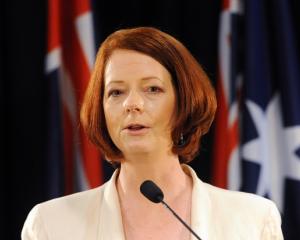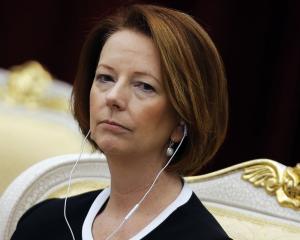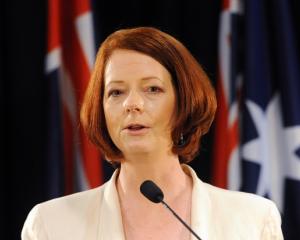Although Rudd has repeated his rejection of another challenge, pressure has grown after worsening polls that have also shown the Government's only hope of survival rests with the return of the former leader.
Gillard has made it clear she has no intention of stepping aside, but with 95 days left before the election there is widespread speculation that a new crisis will peak when Parliament resumes next week.
Some commentators are predicting Gillard will be replaced by Rudd within a fortnight, pushed aside by a panicking Government that on latest polling will lose as many as 40 seats, including a raft of senior ministers.
A defeat of that scale would doom Labor to at least two terms, and possibly a decade, in Opposition.
But ejecting Gillard could bring new, potentially equally serious problems.
Two of the crossbenchers crucial to the Government's tenuous hold on power, New South Wales independents Tony Windsor and Rob Oakshott, have said their deal to back Labor had been made with Gillard and would end if she was dumped.
Windsor repeated yesterday that his agreement would be "null and void" in the event of a successful Rudd coup.
Without their support for the Government Opposition Leader Tony Abbott could win a vote of no confidence, precipitating an election in early August - although some analysts believe a renewed Rudd leadership could itself opt for an earlier date in the hope of catching the Coalition off guard.
At the centre of the new tempest hammering Gillard is her key supporter Bill Shorten, whose continued backing is essential to her leadership.
If Shorten, the Workplace Relations Minister and Victorian powerbroker, changed allegiance Gillard would be doomed, and it was rumours that his support was weakening which sparked the renewed leadership speculation.
Last week Shorten conceded that if the polls were correct Labor was heading for disaster in September, and yesterday News Ltd papers reported that private polling had shown a 13 per cent swing against him in his northwest Melbourne seat of Maribyrnong.
Speculation was further fuelled by the view of ABC presenter Barrie Cassidy, one of Australia's most respected political journalists, who said Gillard had lost significant support in the caucus, with key players now planning when and how she should be approached to step aside.
"Those who have changed their thinking are convinced that in any case, she must be close to deciding for herself that continuing on through a torrid and hopeless 10-week campaign is intolerable," he said.
Shorten, however, yesterday reaffirmed his support for Gillard.
But the mood for change is rapidly growing within Labor ranks, erupting into public criticism and despair as the polls show an unrelenting descent.
Confidential polling by the Council of Trade Unions has reportedly shown "unprecedented" swings of 12-15 per cent in marginal Labor seats, and internal Labor Party polling reported in the Australian yesterday predicted the loss of some of its safest seats and huge swings among the outer-suburban working class and in migrant areas.
The newspaper said voters would axe at least nine ministers, including Treasurer Wayne Swan, Attorney-General Mark Dreyfus and School Education Minister Peter Garrett. While still despised by many MPs, Rudd is increasingly seen as the only way out.
Rudd remains popular with voters - he was mobbed by cheering supporters while campaigning in Geelong, Victoria, last week - and has maintained a high profile while repeating his refusal to take the leadership.
A Fairfax Media-ReachTEL poll yesterday said Labor's support would jump by almost seven points in the two-party preferred vote that determines Australian elections if he was returned as leader.
- Greg Ansley







